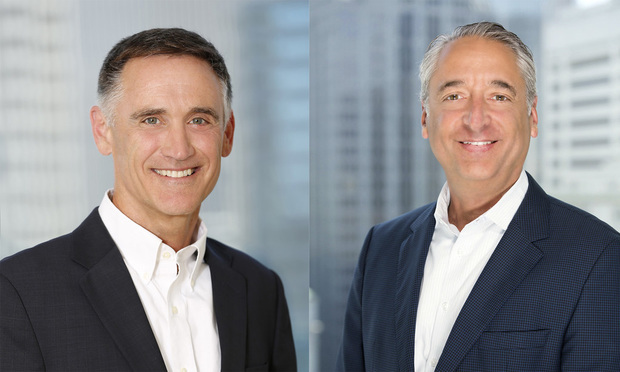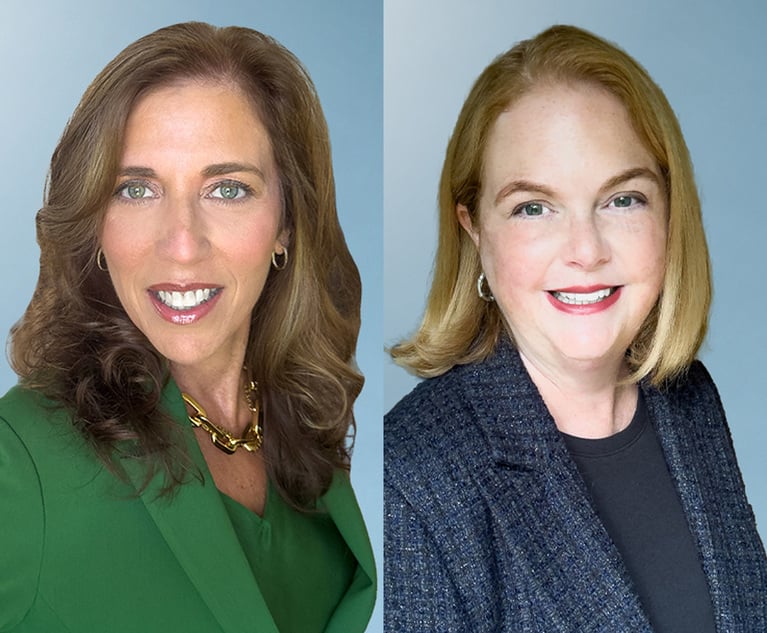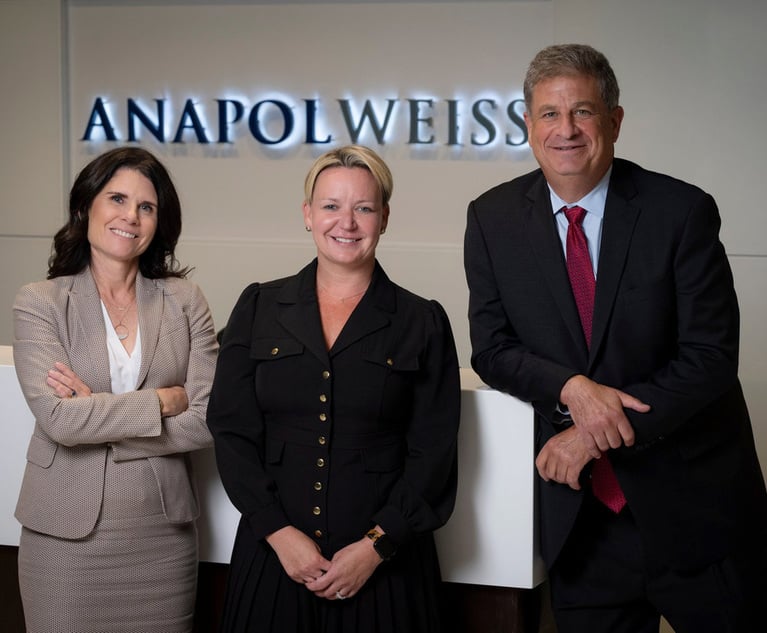Breaking Into the Bay Area Corporate Legal Market—a Primer
No major metropolitan area in the United States is as ripe for the legal profession as the San Francisco Bay Area.
March 23, 2018 at 11:45 AM
6 minute read

Overview of the Market
No major metropolitan area in the United States is as ripe for the legal profession as the San Francisco Bay Area. In fact, in 2017, according to a report by Citi Private Bank, law firms based in the Bay Area led the nation in revenue growth (up 7.2 percent) and demand growth (up 4.8 percent, far above the national average). More than 70 of the AmLaw100 firms have an office here and are competing for talent, for good reason. The Bay Area is the epicenter of global growth in technology. As technology-driven companies and their investors become established, mature, diversify and globalize, they generate an enormous amount of legal work across practices.
There have been success stories of out-of-town firms breaking into this exclusive club and gaining significant market share, but doing so requires a deep understanding of the market and the ability to compete with top indigenous law firms that have established relationships with technology companies, high profile serial entrepreneurs and venture capitalists. The most obvious example of this is Goodwin Procter, a Boston-based law firm that identified and attracted lateral corporate partners primarily from Gunderson and Wilson Sonsini, and then grew from there to establish itself as a recognized and serious player among the law firms servicing the top emerging companies and funds. Los Angeles-based Latham & Watkins also built an impressive and robust corporate practice in the Bay Area by attracting top laterals from Cooley, Wilson Sonsini and others over the years. Other firms have developed successful, vibrant offices in the Bay Area, not by following the emerging companies and venture blueprint, but by leveraging other platform strengths that attract company clients here, such as cross-border M&A, capital markets, private equity, regulatory and litigation/trial work.
Keys to Lateral Growth in Silicon Valley—Know Your Audience
Silicon Valley is driven by an energetic culture of innovation and risk-taking. Law firms that enter this market and show curiosity, open-mindedness, flexibility and understanding of this culture have a chance to succeed and grow here. On the flip side, firms that are too wedded to the traditional role of lawyers as detached advisers with a narrow practice focus, or believe that a strong law firm brand in other geographies necessarily translates here, will find themselves struggling and falling short of their goals. It is essential that senior management and key stakeholders are aligned with the unique mindset that translates into success here, but can be at odds with the typically methodical, analytical, conservative thinking many lawyers habitually fall into. In order to recruit effectively, and not be dismissed out of hand by the talent base, the firm's decision-makers, and every partner involved in interviewing partner candidates, must reflect that they understand and embrace these core concepts. Knowing and internalizing them are essential in order to communicate effectively and to recruit successfully.
The Structure and Economics of the Emerging Companies Corporate Practice
Much of the Bay Area corporate practice is fed by a pipeline of VC-backed emerging companies, which follow an economic model that is incompatible with the billing philosophy of many law firms from other geographies. A number of prominent corporate partners with longstanding ties to the Bay Area have developed practices that include a mix of public and late-stage private companies that drive a significant amount of revenue to their firm ($5 million to $10 million or more annually). However, with few exceptions, those partners rely on relationships with the local emerging companies/VC ecosystem and the ability to offer flexible billing arrangements to their early-stage clients to replenish their pipeline, and are at firms that understand and support that practice. As such, to be successful in recruiting corporate partners in Silicon Valley, law firms must demonstrate that they understand this and are willing to partner with start-up clients and investors economically as a demonstration of their commitment to helping the new enterprise succeed.
This economic investment typically constitutes some combination of discounts on up-front legal work relating to the initial formation and financing, a limited deferral of fees until a first major funding event, and an equity investment by the firm. The total cost to the firm of these economic concessions typically is not large (generally $50,000 per company or less), and the economic upside if the company succeeds can be millions of dollars at close to 100-percent realization as long as the firm provides good, responsive service during the high-growth period after initial funding and up through a successful exit event. This requires a continuing commitment of time and resources that comes with compelling upside, but requires patience and a long-term view that some firms find challenging.
Moreover, it is vital to understand that a successful launch of an emerging companies practice requires scale in order to be credible and successful. The technology and startups community will likely not embrace a firm entering this market until they start to see the “network effect” of partners showing up on deals repeatedly. Not only will this likely entail recruiting three or more partners with credibility and a brand in the practice, but will also require the firm to have a plausible and convincing game plan for necessary support practices, including executive compensation and technology transactions.
Conclusion
Breaking into the Bay Area corporate legal market is nuanced, complex and difficult. Moreover, talent base is jaded about out-of-town firms attempting to establish themselves here after witnessing many failed attempts by firms that lacked a sophisticated understanding about how to succeed here. That being said, the potential upside is tremendously attractive in terms of recruiting talent and building relationships among the leading and emerging technology and life sciences companies. Thoroughly preparing senior management, and every partner involved in a lateral recruiting effort, in the unique cultural mindset that exists here will at least give the firm a chance at success.
Paul Allen and Robert Brigham are partners in the partner practice group of recruiting firm Major, Lindsey & Africa.
This content has been archived. It is available through our partners, LexisNexis® and Bloomberg Law.
To view this content, please continue to their sites.
Not a Lexis Subscriber?
Subscribe Now
Not a Bloomberg Law Subscriber?
Subscribe Now
NOT FOR REPRINT
© 2025 ALM Global, LLC, All Rights Reserved. Request academic re-use from www.copyright.com. All other uses, submit a request to [email protected]. For more information visit Asset & Logo Licensing.
You Might Like
View All
Once the LA Fires Are Extinguished, Expect the Litigation to Unfold for Years
5 minute read

Faegre Drinker Adds Three Former Federal Prosecutors From Greenberg Traurig
4 minute read
Anapol Weiss Acquires Boutique Led by Star Litigator Alexandra Walsh
5 minute readTrending Stories
- 1We the People?
- 2New York-Based Skadden Team Joins White & Case Group in Mexico City for Citigroup Demerger
- 3No Two Wildfires Alike: Lawyers Take Different Legal Strategies in California
- 4Poop-Themed Dog Toy OK as Parody, but Still Tarnished Jack Daniel’s Brand, Court Says
- 5Meet the New President of NY's Association of Trial Court Jurists
Who Got The Work
J. Brugh Lower of Gibbons has entered an appearance for industrial equipment supplier Devco Corporation in a pending trademark infringement lawsuit. The suit, accusing the defendant of selling knock-off Graco products, was filed Dec. 18 in New Jersey District Court by Rivkin Radler on behalf of Graco Inc. and Graco Minnesota. The case, assigned to U.S. District Judge Zahid N. Quraishi, is 3:24-cv-11294, Graco Inc. et al v. Devco Corporation.
Who Got The Work
Rebecca Maller-Stein and Kent A. Yalowitz of Arnold & Porter Kaye Scholer have entered their appearances for Hanaco Venture Capital and its executives, Lior Prosor and David Frankel, in a pending securities lawsuit. The action, filed on Dec. 24 in New York Southern District Court by Zell, Aron & Co. on behalf of Goldeneye Advisors, accuses the defendants of negligently and fraudulently managing the plaintiff's $1 million investment. The case, assigned to U.S. District Judge Vernon S. Broderick, is 1:24-cv-09918, Goldeneye Advisors, LLC v. Hanaco Venture Capital, Ltd. et al.
Who Got The Work
Attorneys from A&O Shearman has stepped in as defense counsel for Toronto-Dominion Bank and other defendants in a pending securities class action. The suit, filed Dec. 11 in New York Southern District Court by Bleichmar Fonti & Auld, accuses the defendants of concealing the bank's 'pervasive' deficiencies in regards to its compliance with the Bank Secrecy Act and the quality of its anti-money laundering controls. The case, assigned to U.S. District Judge Arun Subramanian, is 1:24-cv-09445, Gonzalez v. The Toronto-Dominion Bank et al.
Who Got The Work
Crown Castle International, a Pennsylvania company providing shared communications infrastructure, has turned to Luke D. Wolf of Gordon Rees Scully Mansukhani to fend off a pending breach-of-contract lawsuit. The court action, filed Nov. 25 in Michigan Eastern District Court by Hooper Hathaway PC on behalf of The Town Residences LLC, accuses Crown Castle of failing to transfer approximately $30,000 in utility payments from T-Mobile in breach of a roof-top lease and assignment agreement. The case, assigned to U.S. District Judge Susan K. Declercq, is 2:24-cv-13131, The Town Residences LLC v. T-Mobile US, Inc. et al.
Who Got The Work
Wilfred P. Coronato and Daniel M. Schwartz of McCarter & English have stepped in as defense counsel to Electrolux Home Products Inc. in a pending product liability lawsuit. The court action, filed Nov. 26 in New York Eastern District Court by Poulos Lopiccolo PC and Nagel Rice LLP on behalf of David Stern, alleges that the defendant's refrigerators’ drawers and shelving repeatedly break and fall apart within months after purchase. The case, assigned to U.S. District Judge Joan M. Azrack, is 2:24-cv-08204, Stern v. Electrolux Home Products, Inc.
Featured Firms
Law Offices of Gary Martin Hays & Associates, P.C.
(470) 294-1674
Law Offices of Mark E. Salomone
(857) 444-6468
Smith & Hassler
(713) 739-1250






